Why Status Matters To American Chimps
From “threatened” to “endangered,” a change in US classification increases protections for captive chimpanzees here.
By Vicki Croke
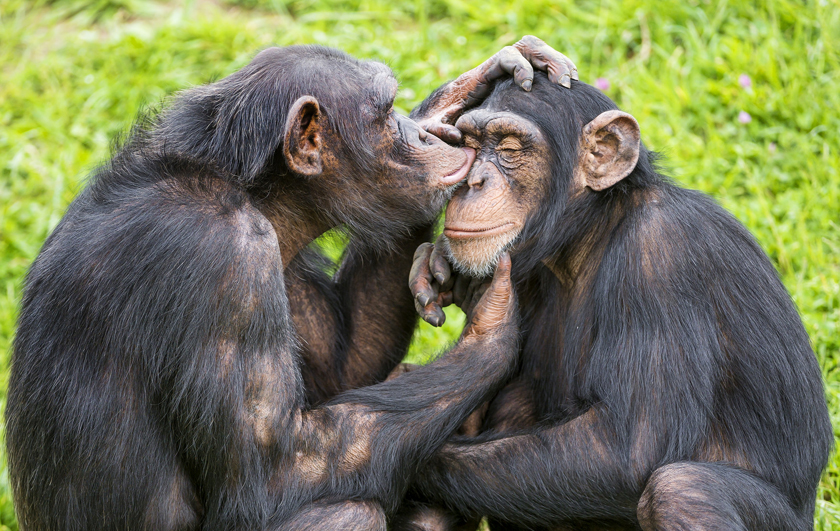
The new ruling increases protections for a species that Wayne Pacelle of HSUS says has a sense of past and future, and is intelligent and social. Photo: Tambako The Jaguar/Flickr.
Just like their relatives in the wild, captive chimpanzees in the United States will now be considered “endangered,” and receive the special protections that come with that designation.
Just last week, the United States Fish and Wildlife Service made the ruling on a petition brought by the Humane Society of the United States and Jane Goodall, among others, in 2010.
Vicki spoke with Here&Now’s Robin Young about the new ruling on chimps in the US:
The more than 1,700 chimps who live in the US—some as pets in the states that allow that, some in the entertainment industry, 265 in accredited zoos, nearly 200 in unaccredited zoos, 560 in sanctuaries, and about 730 in biomedical labs—will be affected by the decision.
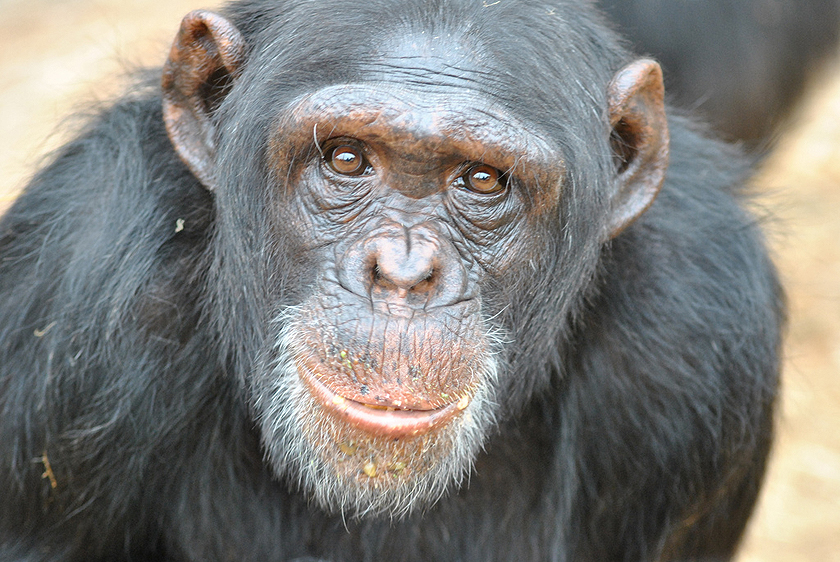
The new ruling has the potential to contribute to the ending of medical research in the United States. (Mimi at Chimp Eden Sanctuary.) Photo: Afrika Force/Flickr.
This ruling which will go into effect on September 14 of this year (to allow a grace period) will “radically restrict what people can do to chimpanzees,” according to Wayne Pacelle, head of the Humane Society of the United States, and one of the key figures in making this change. He explains that “now, all chimpanzees, whether wild or captive, are going to be protected by one of the strongest laws we have in the US for animals—that’s the Endangered Species Act—that forbids taking these animals, injuring, or harming them for any purpose except to advance the conservation of the species in the wild.”
It could contribute to ending the use of chimps in medical research. For labs wanting to do invasive research, there will some big hurdles.
According to the New York Times:
The changes will create barriers to biomedical research, according to [Dan] Ashe [the United States Fish and Wildlife Service’s director]. There are 730 chimpanzees in the custody of biomedical laboratories, according to chimpcare.org, and the changes require that any research that might harm or harass chimpanzees requires a permit.
Scientists will also need a permit to sell chimpanzee blood or tissue across state borders. In order to obtain a permit, biomedical researchers must “demonstrate that their research would be directly and substantially supporting the conservation of chimpanzees in the wild,” Ashe said.
And the US Fish and Wildlife Service has said that this doesn’t mean that a lab could do invasive research on a chimp and simply donate money to a chimp conservation cause—the process of permitting will be a rigorous one.
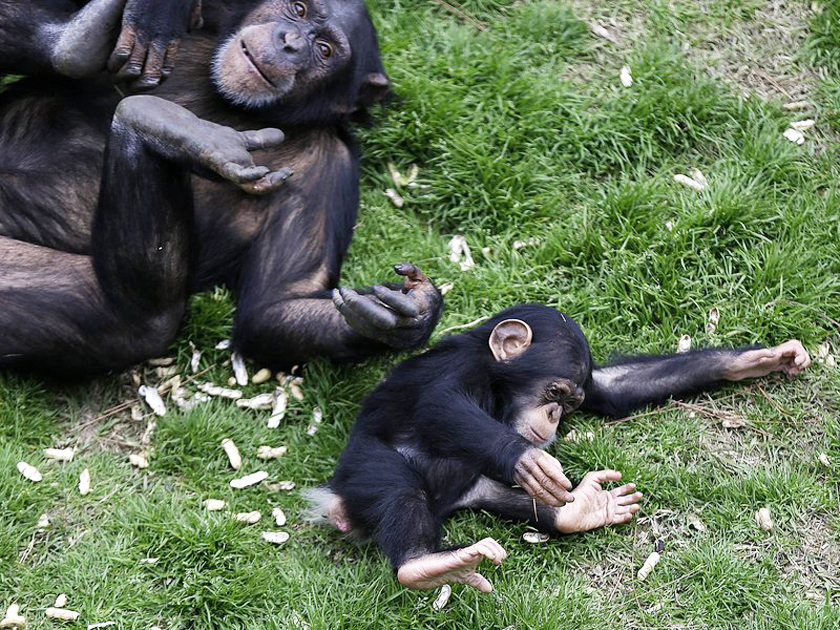
Chimp Haven, in Louisiana, is one of the sanctuaries that can house chimps taken out of medical labs. Photo: Gerald Herbert/AP.
“Anyone using a chimp and crossing state lines with them has to be permitted. And if there’s any harming of the chimp, it has to be done for the express purpose of aiding the conservation of the species,” said Pacelle. “So this will put in jeopardy any use of chimps in film, television, commercials, the pet trade, and biomedical research.”
People with pet chimps, and labs with chimps can still keep them, but there will be a strict permitting process for activities with the chimps.
This decision comes just two years after an important change made by the National Institutes of Health.
According to the Daily Mail:
The move to reclassify captive chimpanzees comes as the National Institutes of Health are retiring nearly 400 of the apes that had been used at their facilities.
The body made a decision in 2013 to retire the chimps to sanctuaries, keeping only 50 for research purposes…
…An Institute of Medicine panel and an NIH panel found that testing on chimpanzees was no longer necessary for research on human diseases.
Housing hundreds of chimps coming out of research labs will be difficult, but not impossible, according to Pacelle. He cites Save the Chimps in Florida, and Chimp Haven in Louisiana, as two sanctuaries that will be involved. And it will require money to increase infrastructure and to provide for the ongoing care of the animals. He says that chimps can live into their sixties and providing proper care will be expensive.
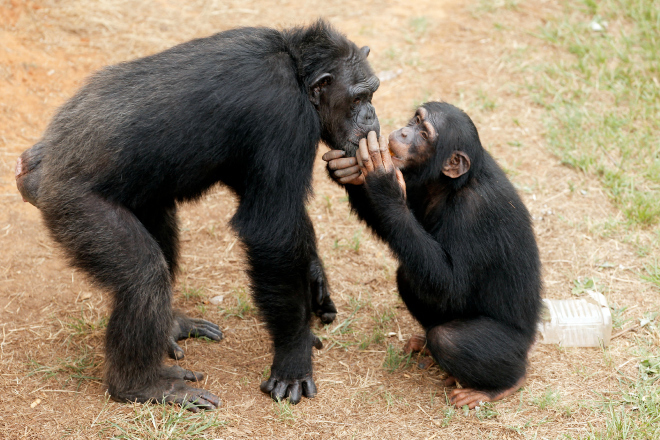
HSUS estimates that it costs $20,000 a year to properly care for a chimp in a sanctuary. Photo: Brandon Wade/AP/HSUS.
“We estimate it costs $20,000 dollars a year in many facilities to care for a chimp properly. So if you think about a 50-year lifespan once a chimp moves to a sanctuary, it places a burden on the animal welfare community for a million dollars over the life of a that chimp, per chimp for a problem that was not of our making.”
HSUS is currently paying to support a colony of chimps in Liberia that had been used by a US lab—the New York Blood Center—for 30 years, and supported for another 10 years after that, according to the New York Times. But the lab has withdrawn funding. That’s a situation without a resolution right now.
The US Fish and Wildlife Service has said that the way we used chimps in this country gave people a misimpression of the status of a species that actually desperately needs to be conserved.
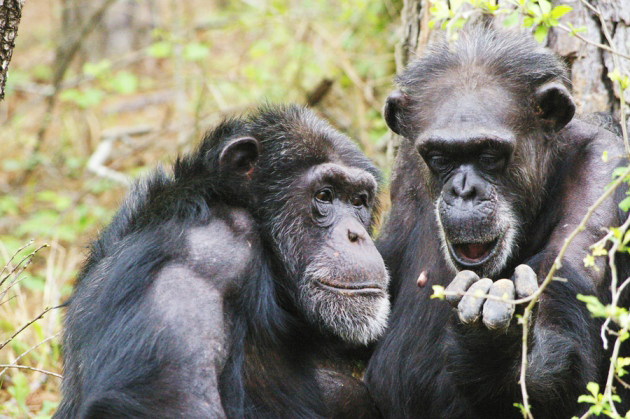
A social life is important to this social species. (Mason and Rita at Chimp Haven.) Photo: Amy Fultz/Chimp Haven.
Wayne Pacelle agrees. “They are intelligent, they are sociable. We see them in laboratory settings, in other settings. They have the effects of post-traumatic stress disorder. And this is not right. It’s about time that they were properly listed as endangered because they are really at threat in the wild.”
It’s an important ruling for the chimps here, and, clearly, the way we treat them in our country and the way we perceive them can have a profound effect on their conservation in the wild where there are anywhere from 170,000 to 300,000 of these incredible animals left.

3 Responses to “Why Status Matters To American Chimps”
It is a stupid ruling. It will not save chimps from extinction and it will kill people
How will it kill people?
@RandyJanssen –
Chimps are our closest relatives, sharing well over 90% of our DNA. Do you want to perform lab research on your own relatives?
Better yet, if you’re so eager to use higher primates for biomedical research, why don’t you volunteer yourself? We could stick you in a cage and inject you with all kinds of dubious substances, and that would be even more valuable than doing it to our chimp cousins, since you’re (presumably) more human than them.
Comments are closed.